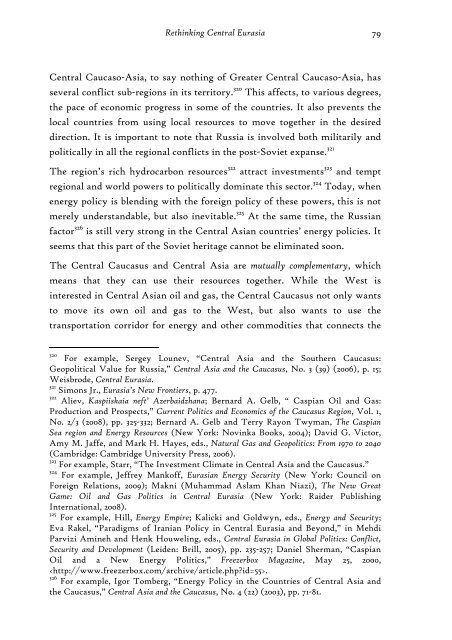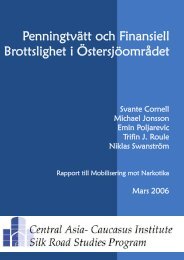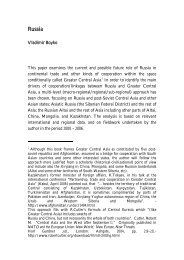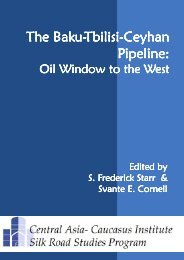Eurasianism and the Concept of Central Caucaso-Asia
Eurasianism and the Concept of Central Caucaso-Asia
Eurasianism and the Concept of Central Caucaso-Asia
Create successful ePaper yourself
Turn your PDF publications into a flip-book with our unique Google optimized e-Paper software.
Rethinking <strong>Central</strong> Eurasia 79<br />
<strong>Central</strong> <strong>Caucaso</strong>-<strong>Asia</strong>, to say nothing <strong>of</strong> Greater <strong>Central</strong> <strong>Caucaso</strong>-<strong>Asia</strong>, has<br />
several conflict sub-regions in its territory. 320 This affects, to various degrees,<br />
<strong>the</strong> pace <strong>of</strong> economic progress in some <strong>of</strong> <strong>the</strong> countries. It also prevents <strong>the</strong><br />
local countries from using local resources to move toge<strong>the</strong>r in <strong>the</strong> desired<br />
direction. It is important to note that Russia is involved both militarily <strong>and</strong><br />
politically in all <strong>the</strong> regional conflicts in <strong>the</strong> post-Soviet expanse. 321<br />
The region’s rich hydrocarbon resources 322 attract investments 323 <strong>and</strong> tempt<br />
regional <strong>and</strong> world powers to politically dominate this sector. 324 Today, when<br />
energy policy is blending with <strong>the</strong> foreign policy <strong>of</strong> <strong>the</strong>se powers, this is not<br />
merely underst<strong>and</strong>able, but also inevitable. 325 At <strong>the</strong> same time, <strong>the</strong> Russian<br />
factor 326 is still very strong in <strong>the</strong> <strong>Central</strong> <strong>Asia</strong>n countries’ energy policies. It<br />
seems that this part <strong>of</strong> <strong>the</strong> Soviet heritage cannot be eliminated soon.<br />
The <strong>Central</strong> Caucasus <strong>and</strong> <strong>Central</strong> <strong>Asia</strong> are mutually complementary, which<br />
means that <strong>the</strong>y can use <strong>the</strong>ir resources toge<strong>the</strong>r. While <strong>the</strong> West is<br />
interested in <strong>Central</strong> <strong>Asia</strong>n oil <strong>and</strong> gas, <strong>the</strong> <strong>Central</strong> Caucasus not only wants<br />
to move its own oil <strong>and</strong> gas to <strong>the</strong> West, but also wants to use <strong>the</strong><br />
transportation corridor for energy <strong>and</strong> o<strong>the</strong>r commodities that connects <strong>the</strong><br />
320 For example, Sergey Lounev, “<strong>Central</strong> <strong>Asia</strong> <strong>and</strong> <strong>the</strong> Sou<strong>the</strong>rn Caucasus:<br />
Geopolitical Value for Russia,” <strong>Central</strong> <strong>Asia</strong> <strong>and</strong> <strong>the</strong> Caucasus, No. 3 (39) (2006), p. 15;<br />
Weisbrode, <strong>Central</strong> Eurasia.<br />
321 Simons Jr., Eurasia’s New Frontiers, p. 477.<br />
322 Aliev, Kaspiiskaia neft’ Azerbaidzhana; Bernard A. Gelb, “ Caspian Oil <strong>and</strong> Gas:<br />
Production <strong>and</strong> Prospects,” Current Politics <strong>and</strong> Economics <strong>of</strong> <strong>the</strong> Caucasus Region, Vol. 1,<br />
No. 2/3 (2008), pp. 325-332; Bernard A. Gelb <strong>and</strong> Terry Rayon Twyman, The Caspian<br />
Sea region <strong>and</strong> Energy Resources (New York: Novinka Books, 2004); David G. Victor,<br />
Amy M. Jaffe, <strong>and</strong> Mark H. Hayes, eds., Natural Gas <strong>and</strong> Geopolitics: From 1970 to 2040<br />
(Cambridge: Cambridge University Press, 2006).<br />
323 For example, Starr, “The Investment Climate in <strong>Central</strong> <strong>Asia</strong> <strong>and</strong> <strong>the</strong> Caucasus.”<br />
324 For example, Jeffrey Mank<strong>of</strong>f, Eurasian Energy Security (New York: Council on<br />
Foreign Relations, 2009); Makni (Muhammad Aslam Khan Niazi), The New Great<br />
Game: Oil <strong>and</strong> Gas Politics in <strong>Central</strong> Eurasia (New York: Raider Publishing<br />
International, 2008).<br />
325 For example, Hill, Energy Empire; Kalicki <strong>and</strong> Goldwyn, eds., Energy <strong>and</strong> Security;<br />
Eva Rakel, “Paradigms <strong>of</strong> Iranian Policy in <strong>Central</strong> Eurasia <strong>and</strong> Beyond,” in Mehdi<br />
Parvizi Amineh <strong>and</strong> Henk Houweling, eds., <strong>Central</strong> Eurasia in Global Politics: Conflict,<br />
Security <strong>and</strong> Development (Leiden: Brill, 2005), pp. 235-257; Daniel Sherman, “Caspian<br />
Oil <strong>and</strong> a New Energy Politics,” Freezerbox Magazine, May 25, 2000,<br />
.<br />
326 For example, Igor Tomberg, “Energy Policy in <strong>the</strong> Countries <strong>of</strong> <strong>Central</strong> <strong>Asia</strong> <strong>and</strong><br />
<strong>the</strong> Caucasus,” <strong>Central</strong> <strong>Asia</strong> <strong>and</strong> <strong>the</strong> Caucasus, No. 4 (22) (2003), pp. 71-81.






